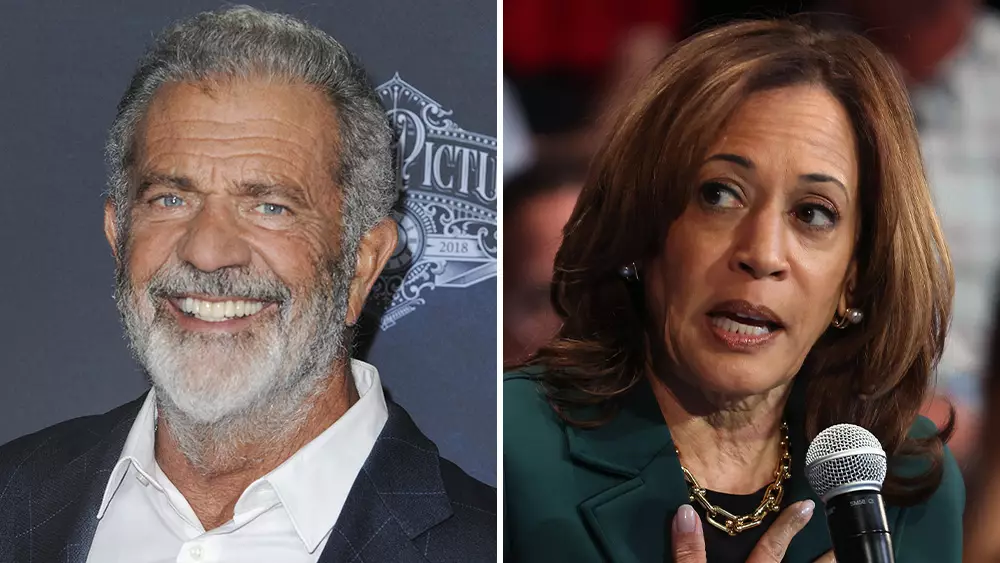In the unpredictable landscape of Hollywood, relationships can be as complex as the narratives portrayed on screen. Recently, Andrew Garfield expressed admiration for Mel Gibson, particularly highlighting his journey of self-healing over the years. This statement appears to reflect Garfield’s appreciation for personal growth and forgiveness. However, Gibson’s subsequent remarks about Vice President Kamala Harris have raised eyebrows and prompted reevaluation of Garfield’s endorsement. It underscores an essential truth in the entertainment industry: people in the limelight often grapple with contradictory opinions and values, creating a tangled web of admiration and disapproval.
At LAX, Mel Gibson was caught on camera making derogatory comments about Kamala Harris, describing her intelligence with a crude metaphor and stating his support for Donald Trump. His remarks—labeling Harris as having “the IQ of a fence post”—exhibit a troubling inclination toward divisive rhetoric rather than constructive dialogue. Such statements do not merely stand alone; they form part of a troubling pattern in Gibson’s public persona. His past encounters with scandal, including a 2006 DUI arrest laden with outrageous and anti-Semitic outbursts, showcase a troubling history that complicates his artistic achievements.
By lampooning Harris in such a crude manner, Gibson not only diminished the political discourse but also reopened wounds from a past rife with offensive language and behavior. The juxtaposition of Garfield’s praise for Gibson and Gibson’s inflammatory remarks certainly invites scrutiny. It raises the question: can one truly appreciate an artist’s work without condoning their controversial opinions or actions?
Political Discourse and Celebrity Culture
The political landscape has dramatically shifted over the past few years, and celebrity rhetoric now heavily influences public discourse. Gibson’s statements echo similar sentiments expressed by former President Trump, whose critiques of Harris have often lacked nuance and reflected a broader trend of toxic political engagement. By aligning himself with Trump’s views, Gibson not only risks alienating a significant portion of the public but also reinforces the negative stereotypes often associated with Hollywood elites.
While celebrities may feel inclined to voice their political opinions, the manner in which they do so can contribute to societal divisiveness rather than foster understanding. Political figures, celebrities, and the media form an interconnected trio that can either uplift or hinder democratic ideals. Gibson’s choice to denigrate Harris can be viewed as symptomatic of celebrity culture’s inclination toward sensationalism over substance.
The Impact of History on Present Perception
Gibson’s history of problematic behavior cannot be overlooked when evaluating his current actions. His past actions laid a precarious foundation for how his contemporary statements will be received. The public’s reaction often draws on an individual’s previous dealings as a frame of reference. For instance, Gibson’s infamous barrage of homophobic and racist remarks from years ago continues to haunt his public image, casting a long shadow over any positive perceptions stemming from his professional accomplishments.
It’s essential to consider how past behavior influences present acceptability. While Garfield’s admiration for Gibson may stem from a belief in personal rehabilitation, the troubling nature of Gibson’s past interactions—a history of crude and offensive remarks—complicates this narrative of healing and redemption.
This saga brings forth crucial questions regarding accountability within the entertainment industry. Can a Hollywood figure move forward from their past indiscretions, and should their art be separated from the problematic aspects of their character?
The recent controversy surrounding Gibson reflects the ongoing cultural conversation about an individual’s right to redemption versus the public’s expectation for accountability. Enlightening discussions about systemic issues—race, gender, and political partisanship—are pivotal; yet, they risk being overshadowed by inflammatory commentary that detracts from productive dialogue.
Ultimately, as Andrew Garfield navigates his public stance regarding Mel Gibson, he may need to reconsider the implications of his praise in light of evolving societal norms and expectations surrounding accountability and truth in public discourse. The complexities of Hollywood relationships will continue to evolve, reflecting broader societal struggles with the intersection of art, personal conduct, and public perception.

